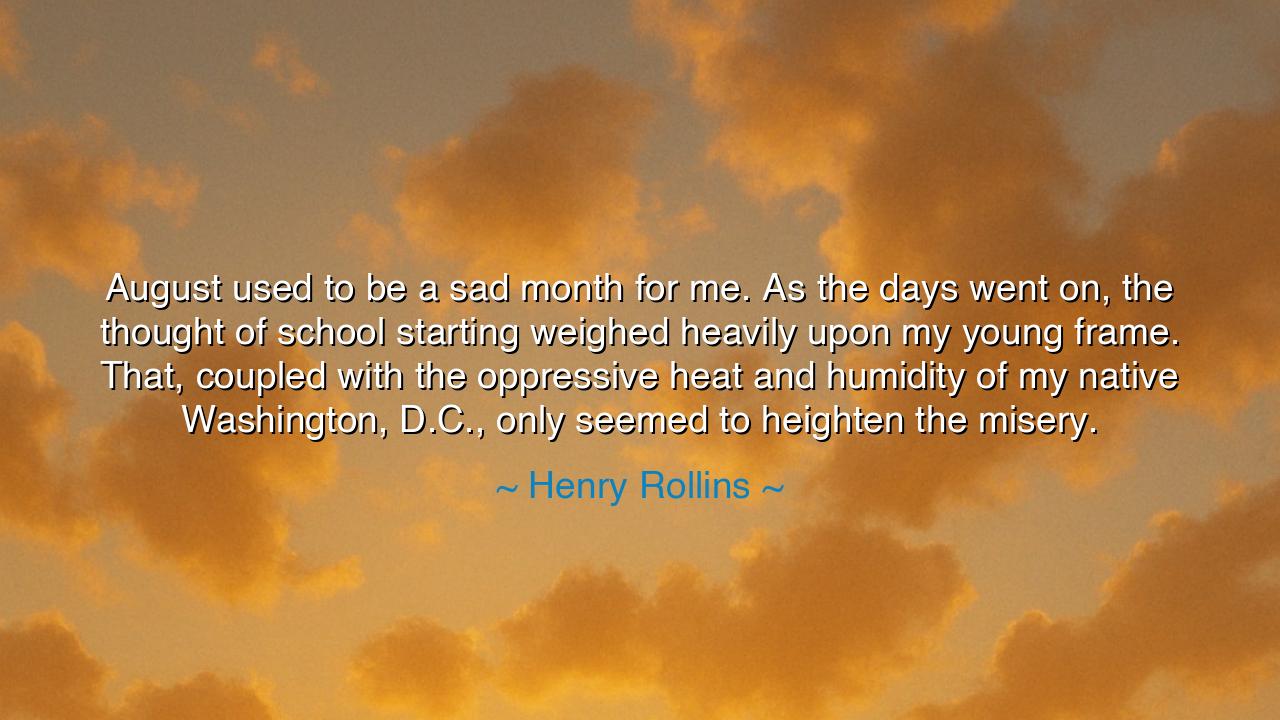
August used to be a sad month for me. As the days went on, the
August used to be a sad month for me. As the days went on, the thought of school starting weighed heavily upon my young frame. That, coupled with the oppressive heat and humidity of my native Washington, D.C., only seemed to heighten the misery.






There are seasons in life that carry weight beyond the passing of days, when the heart feels burdened even as the sun shines. Henry Rollins, reflecting on his youth, said, “August used to be a sad month for me. As the days went on, the thought of school starting weighed heavily upon my young frame. That, coupled with the oppressive heat and humidity of my native Washington, D.C., only seemed to heighten the misery.” In these words lies a meditation on the interplay of anticipation, environment, and the human psyche. Even the most ordinary transitions—summer yielding to school—can become sources of profound emotional tension.
Rollins’ reflection illustrates the weight of anticipation, the anxiety that precedes inevitable change. Ancient philosophers understood the power of expectation in shaping human experience. Seneca taught that fear of the future often exceeds the reality of events, creating suffering in the mind before life presents its challenges. Rollins’ dread of school is emblematic of this timeless truth: the burden of imagined difficulty can heighten misery, intensifying emotional response beyond immediate circumstance.
The oppressive heat and humidity of his native Washington, D.C., serves as a metaphor for external forces that amplify internal stress. The ancients recognized that environment shapes mood and behavior: Aristotle spoke of how climate and conditions affect temperament, while the Stoics emphasized the importance of cultivating inner resilience in the face of external discomfort. Rollins’ combination of physical discomfort and anticipatory dread illustrates how body and mind intertwine, creating a compounded experience of suffering.
There is also a lesson in the universality of youthful anxiety. Consider the writings of Jean-Jacques Rousseau, who described childhood as a period in which imagination and sensitivity make even ordinary events emotionally charged. The beginning of school, an annual rite, becomes symbolic of challenge, judgment, and social negotiation. Rollins’ August melancholy resonates across time and culture: the fear of evaluation, the pressure to perform, and the uncertainty of routine are experiences shared by countless youths across generations.
Rollins’ narrative underscores the intensity of formative experiences. Childhood is a time when small events feel enormous, when the mind magnifies external pressures and internalizes worry. In literature, such as Charles Dickens’ David Copperfield, the young protagonist experiences ordinary transitions—school, work, family conflict—with heightened emotional intensity. Rollins’ recollection parallels these historical insights: the internal world of youth transforms everyday occurrences into trials of spirit.
Yet there is wisdom embedded in his reflection: awareness of this tension offers opportunity for growth. The recognition of fear and discomfort as temporary, as well as external to one’s essential self, is a principle emphasized by Stoic and Buddhist teachings alike. By confronting and understanding the sources of emotional weight—the oppressive environment, the anticipation of responsibility—one cultivates resilience and the capacity to navigate life’s challenges with clarity and strength.
From Rollins’ experience emerges a broader lesson: acknowledge the weight of your anticipatory fears, but do not let them define your experience. External conditions, looming responsibilities, and environmental discomfort may exacerbate emotion, yet understanding their role allows one to act with deliberation, perspective, and self-compassion. Childhood anxieties foreshadow adult trials, and the skill of navigating them is cultivated early.
Thus, let Henry Rollins’ words guide reflection: recognize the interplay of environment, anticipation, and emotion, and allow awareness to temper anxiety. Approach the transitions of life—school, work, or other obligations—with understanding, preparation, and resilience. Even in the oppressive heat of circumstance, the mind can cultivate calm, perspective, and strength, transforming seasonal melancholy into lessons of endurance and self-mastery.






AAdministratorAdministrator
Welcome, honored guests. Please leave a comment, we will respond soon